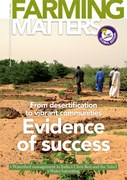People and communities can be amazingly resourceful and innovative when adjusting to change, yet the challenges today are hugely complex. How can we work together to make the changes needed if we are to feed 9 billion people while taking care of the environment?
The CGIAR Research Program on Climate Change, Agriculture and Food Security (CCAFS) addresses the challenge of global warming and declining food security. One of the CCAFSresearch themes, “Integration for Decision Making”, is exploring approaches and methods that enhance knowledge-to-action linkages with a wide range of partners, and assemble data and tools for analysis and planning. Its aim is to develop decision support and communication tools so that policy makers, development partners, researchers and farmers can make decisions with a greater understanding of the interactions between local conditions, national policies and programmes, and international development, in the face of multiple drivers of change.
Tackling complex problems requires trying new approaches, sensing and taking advantage of new opportunities and tapping into collective wisdom and knowledge. “Social learning” facilitates these processes. Social learning approaches rely on knowledge sharing and joint learning to change perspectives, discourses and practices. They are themselves complex but transformative approaches that tighten and enrich the social fabric of change.
Scientists have a key role to play in catalysing change, but we haven’t always tapped into the full potential of diverse partnerships, multi-way communication, co-operation and collaboration. Bridging such gaps between various actors can help us support local decision-making processes related to climate change and food security.
Our vision of success
We want to see more people embracing the idea of joint, transformative learning, of co-creation of knowledge and solutions. This is not a new idea. But the imperatives we are facing now mean that it is high time for a more conscious articulation, promotion and facilitation of social learning approaches in research.
Building on a workshop held in Addis Ababa in May 2012, CCAFS and its partners are working together to develop a strategy to address social learning in agriculture, food security and climate change. These efforts combine a learning and sharing space set up to discuss social learning in climate change with a series of scoping and assessment projects to take this agenda forward.
Already this year, CCAFS is partnering with PROLINNOVA, the international platform to promote local innovation processes, to explore ways to strengthen farmer- led processes that contribute to local resilience to change. IDS and IIED are compiling models and evidence to monitor and evaluate the impact of social learning approaches. Another recent study looked into over 120 social learning initiatives undertaken throughout CGIAR. The intention is to use these to influence how CGIAR scientists, other researchers and the communities they work with apply and communicate their shared knowledge and transformative learning experiences.
What do you think are key components of an effective strategy to use social learning to improve local decision- making about agriculture, food security and climate change? What possible partnerships should we explore? And what issues should we address?
Patti Kristjanson and Ewen Le Borgne
Patti Kristjanson is a CCAFS Research Theme Leader.
Ewen Le Borgne works as knowledge sharing and communication specialist at ILRI, the International Livestock Research Institute. E-mail: e.leborgne@cgiar.org

